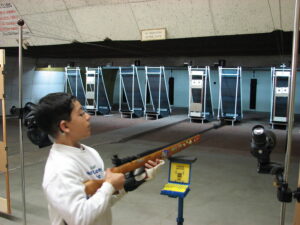Firearms – New sentencing guidelines
December 9, 2020Custody Time Limits & Young Defendants
January 15, 2021Air Weapons – The Law & Proposed Reforms
[Image credit: “4H County Air Rifle Match” by Bob n Renee is licensed under CC BY 2.0
The licensing of air weapons is different across the UK:
- In England and Wales there is no need to acquire a licence to hold an air weapon.
- In Scotland air weapons owners need a specific air weapons licence.
- In Northern Ireland air weapons owners need a firearms licence.
It an offence to sell or gift an air weapon (or ammunition) to a person under 18. It is also an offence to fail to take reasonable precautions to prevent those under the age of 18 from gaining illegal possession of the air weapon.
Whilst people under the age of 18 cannot buy, hire or be gifted an air weapon, they may possess an air weapon under certain circumstances.
Under 18s may possess an air weapon if:
- They are supervised by someone aged 21 or over,
- They are shooting as a member of an approved target shooting club,
- They are shooting at a shooting gallery/ rifle range,
- They are aged 14 or older and are shooting on private premises with the consent of the occupier.
Currently, the only data published on prosecutions of air weapons offences are for the offence ‘firing an air weapon beyond premises’ (prohibited under Sections 23(1) and (4) of the Firearms Act 1968 and Section 34 of the Violent Crime Reduction Act 2006). In 2019, there were 6 prosecutions and 5 convictions for ‘firing an air weapon beyond premises’.
Since 2018, the number of prosecutions has been low compared to previous years. In 2017 there had been 21 prosecutions and 12 convictions, and the 2018 figures (5 prosecutions and 4 convictions) were the lowest for at least eleven years.
In total, between 2008 and 2019, there were 266 prosecutions for this offence, and 216 convictions. There were also 127 cautions issued during this time.
There are no official statistics on attacks on animals but the Royal Society for the Prevention of Cruelty to Animals (RSPCA) has periodically released figures on the number of calls it receives relating to attacks on animals using air weapons. In January 2018, the RSPCA claimed in a press release that it had received 4,500 calls in five years (2013-2017) alleging attacks on animals using air weapons. This averages at around 900 calls per year. These attacks related to at least 5,600 animals or around 1,100 per year.
The most commonly attacked animals in 2017, according to these reports, were wild birds, followed by cats, wild mammals, and dogs. Similar data for 2018 showed that there were 258 reported attacks on cats and 73 attacks on dogs, although a full breakdown by animal type is not available.
The RSPCA has also released figures showing the areas where they received the most complaints about animals being injured by air weapons. In 2018, Yorkshire and the Humber had the most reported attacks, as a region.
The Government announced a review of air weapons regulation in England and Wales on 10 October 2017. The review was commission following a request from a Dr Peter Dean (Her Majesty’s Senior Coroner for Suffolk), who wrote to the Minister following the death of 13-year-old Benjamin Wragge. Benjamin died after being accidently shot with an air weapon.
The Government said that the review would (amongst other things) consider “evidence from Scotland and Northern Ireland, where air weapons are subject to a licensing regime.”
The Government published the findings of their review in November 2020 as part of its consultation on firearms safety. It has decided not to introduce a licensing regime for England and Wales. Instead it is proposing to amend the existing age restrictions for air weapons. It said this represents “targeted action which will address the key risks without introducing additional administration and cost for police forces or air weapon users”.
The Government is proposing to:
- amend the existing offence of failing to take reasonable precautions to prevent children accessing air weapons. The Government is proposing to clarify that ‘reasonable precautions’ must include locking the air weapon out of sight when not in use and storing the ammunition separately
- removing an exemption which currently allows children aged over fourteen to use an air weapon on private land unsupervised with the permission of its occupier.
How can we help?
Firearms possession is a complicated area of law. We ensure we keep up to date with any changes in legislation and case law so that we are always best placed to advise you properly. If you would like to discuss any aspect of your case, please contact any member of our vastly experienced Criminal Defence team, for assistance with any criminal law related matter.
–
Mr John Stokes (John.Stokes@danielwoodman.co.uk),
Mr Anthony Pearce (Anthony.Pearce@danielwoodman.co.uk) or
Mr Daniel Woodman (Daniel.Woodman@danielwoodman.co.uk).



